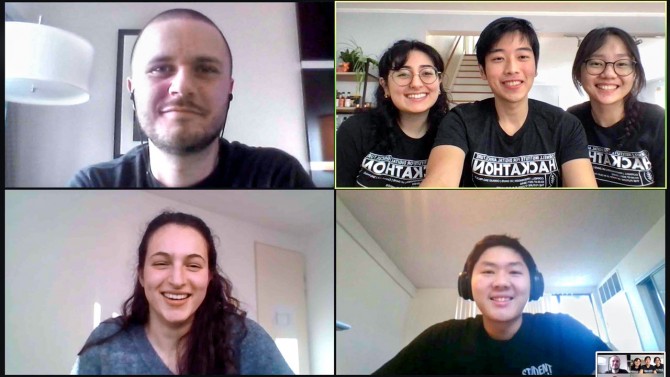Food supply chain app wins digital ag hackathon
By Syl Kacapyr Tom Fleischman
An app that would maximize profit and minimize food spoilage and loss across the agriculture supply chain was named the grand prize winner in the third annual Cornell Institute for Digital Agriculture (CIDA) Hackathon.
The event, held virtually March 5-7, brought together 176 students from 32 teams representing five of the world’s top agriculture schools for a 36-hour hackathon. A mix of undergraduate and graduate students in fields ranging from agriculture and animal science to computer science, engineering and business formed teams and applied technology to agricultural challenges.
“The CIDA hackathon is a celebration of teamwork,” said Susan McCouch, Ph.D. ’90, the Barbara McClintock Professor of Plant Breeding and Genetics in the College of Agriculture and Life Sciences (CALS)and director of CIDA.
Student participants, from an array of academic programs, came from Cornell; the University of California, Davis; Wageningen University of the Netherlands; the University of São Paulo, Brazil; and China Agricultural University.
The online event was produced by Ami Stuart, tech event manager at Entrepreneurship at Cornell.
“The hackathon brings an energetic group of people together across disciplines and universities throughout the world,” McCouch said, “and leverages public, private and government sector expertise to address some of the most important and complex challenges in agriculture and food systems facing the world today.”
And despite the event’s virtual nature, “the excitement and buzz generated by the new ideas of the student participants was still palpable. Where there is a will, there is a way,” said Sarah Pethybridge, associate professor in the Plant Pathology and Plant-Microbe Biology Section of the School of Integrative Plant Science (CALS).
Pethybridge was one of the event’s 27 judges, who hailed from both academia and industry. The judges were among more than 70 mentors who worked with the students throughout the 36 hours of the hackathon.
Being on Zoom allowed the mentors to pop in and out of breakout rooms with ease.
“As several students and mentors pointed out, the chance to jump on the computer and get together with a diverse group of smart, engaged people from around the world that share an interest in digital agriculture was an amazing opportunity,” said Steven Wolf, associate professor of natural resources (CALS) and faculty chair of the hackathon. Pethybridge and Hakim Weatherspoon, professor of computer science, served as hackathon co-chairs.
The winning team, “I Like to Move It, Move It,” was composed of students from Cornell, UC Davis and Wageningen University. Their idea, which applies data science to the problem of food spoiling en route from farm to market, strikes at the very heart of what digital agriculture is all about.
“The history of agricultural modernization is mixed,” Wolf said. “We have succeeded in expanding food production, increasing the productivity of farmers and developing capabilities to deliver affordable, diverse, safe and nourishing food to billions of people. But we also confront persistent rural poverty, economic concentration, problems of malnutrition and obesity, and ecological problems that threaten the future productivity of farmland and surrounding ecosystems.
“This event is a chance for students to discover their passion,” he said, “and to identify how they can position themselves to contribute to efforts to address globally significant social and ecological problems.”
A total of $8,000 in prize money was awarded at the event, including the grand prize of $2,000. Winning team members were: Christopher Prajogo, a sophomore at UC Davis; Riske van Vliet, a junior at Wageningen; and Cornell master of professional studies students Mina Barakatain, Lily Lin and Zenas Lim (all information science) and Whitman Barrett (global development).
Other category-winning teams, who took home $1,500 each, included:
Grand Societal Challenge: Agfrica – employing drone technology to lure locust swarms away from crops and onto barren regionals of non-arable land.
Novelty: ScrApp – a marketplace that connects suppliers of surplus food with the market for food waste, maintaining the value of food through market incentives.
Data: Sprout – an app designed to accompany novice urban growers in food deserts, from seed to harvest, and lets them connect with their community.
Market Ready: tie, Picture Perfect Food (a machine learning-enabled device designed to prevent food waste by estimating the perfect consumption moment of fruit based on color) and Unstuck Truck (an app that optimizes tractor lending in Brazilian sugar cane farms, based on soil content and meteorological data).
All 32 teams’ pitches can be viewed on the CIDA Hackathon website.
Hosts for the event included CIDA; the Ann S. Bowers College of Computing and Information Science; the College of Agriculture and Life Sciences; Cornell Engineering; the College of Veterinary Medicine; and Entrepreneurship at Cornell. Sponsors included Cargill, CIDA co-founding member Microsoft, InfoSys, LoveBeets, Dairy One, Dairy Farmers of America, Hawaiian Macademia Nut Company, Corteva Agriscience, and Specim.
Media Contact
Get Cornell news delivered right to your inbox.
Subscribe

